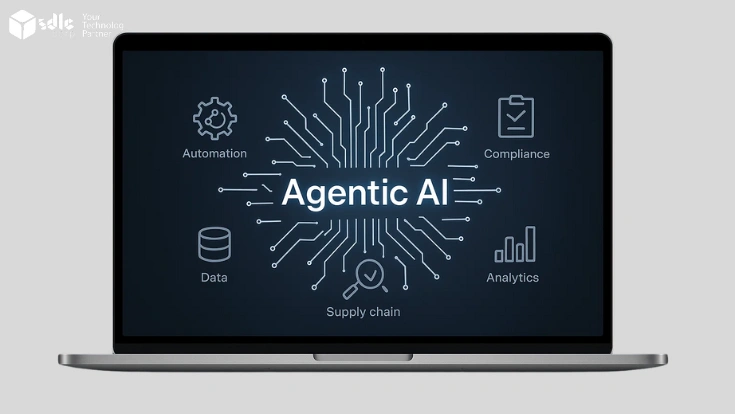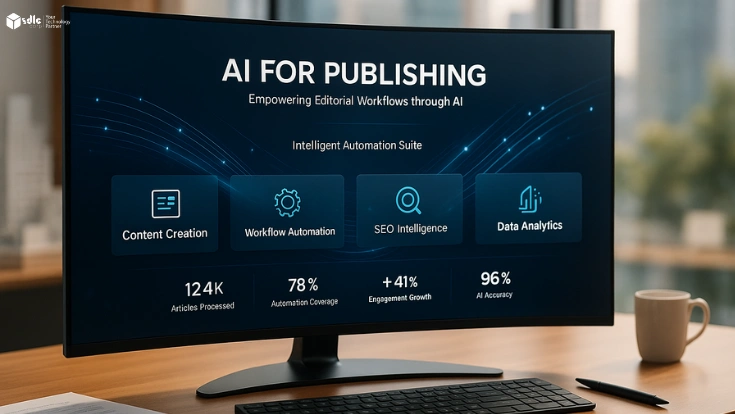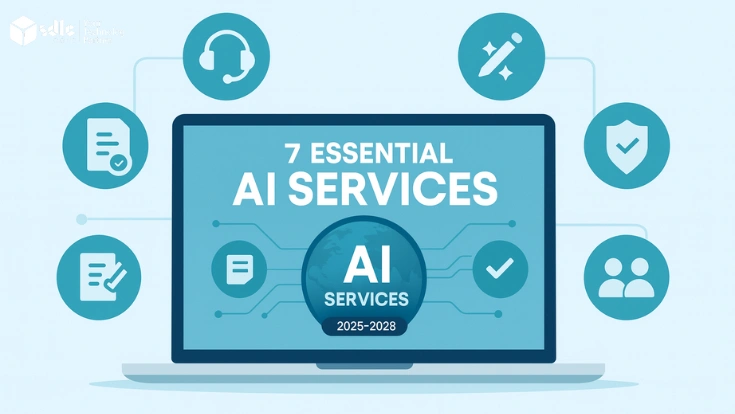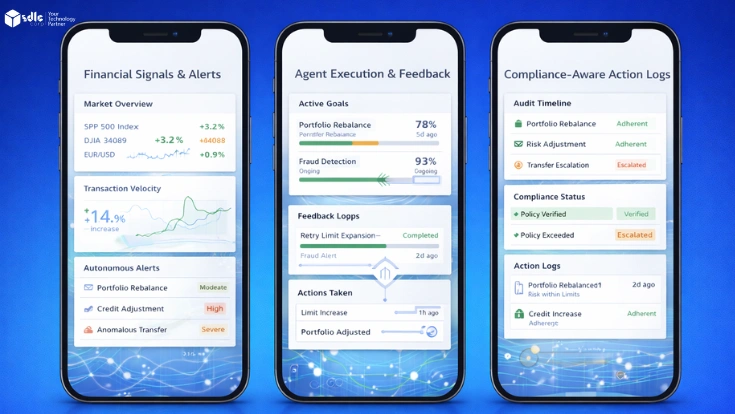Introduction
Artificial intelligence (AI) has been revolutionising many industries in recent years, including the logistics business. Logistics firms have been able to optimise their operations, enhance productivity, cut costs, and improve customer service due to artificial intelligence. The logistics sector is concerned with transporting, storing, and distributing commodities, which can be complicated with several factors and obstacles. AI transforming logistic industry on the other hand, AI technologies such as natural language processing, machine learning (ML), and computer vision have helped streamline these processes and increase overall performance.
Logistics companies are under enormous pressure to meet expanding demand while maintaining high levels of service in this era of globalised trade and e-commerce. AI-powered solutions can aid in the automation of mundane processes, the prediction of demand and supply, the optimisation of routes and timetables, and the real-time tracking and visibility of items. This can result in shorter delivery times, fewer errors, and higher customer satisfaction.
We will be looking at some of the fundamental advantages of AI in logistics, as well as some of the most interesting use cases. We will also go through some of the obstacles that businesses may experience while deploying AI and how to overcome them.
How AI is Transforming the Logistics Industry?
AI is revolutionising the logistics business in a variety of ways, from improving operational efficiency to improving customer experience.

1. Automation
Artificial intelligence (AI) is automating many mundane jobs in the logistics business, including data entry, inventory management, and routing. Automation lowers manual errors while also speeding up processes, increasing efficiency and lowering costs. AI-powered robots, for example, may do repetitive jobs like packaging and loading, allowing logistics companies to optimise their labour.
2. Predictive Analytics
Artificial intelligence (AI) is allowing logistics organisations to generate more accurate predictions about demand, supply, and inventory. To forecast future demand and supply, AI systems analyse massive volumes of data from numerous sources, such as sales data, social media, and weather forecasts. Predictive analytics assists logistics organisations in optimising inventories, reducing waste, and ensuring on-time delivery.
3. Route Optimization
AI-powered route optimisation is increasing the efficiency of logistical operations. To optimise routes, AI systems can analyse real-time data such as traffic, weather, and road conditions. Route optimisation reduces travel time, fuel consumption, and vehicle wear and tear, increasing efficiency and decreasing expenses.
4. Real-Time Tracking and Tracing
AI-powered tracking and tracing systems enable supply chain visibility in real time. Logistics firms can track the location and status of products in route, allowing them to respond swiftly to problems or delays. Transparency and accountability are provided via real-time tracking and tracing systems, which improve the user experience.
To turn these ideas into production-ready solutions, partnering with expert AI development services can help you design, build, and scale your AI initiatives.

Key Benefits of AI in Logistics
Artificial intelligence (AI) is becoming more widespread in practically every business, including the logistics sector. AI in logistics can assist organisations in streamlining operations, optimising procedures, lowering costs, and improving customer experiences. In this essay, we will go over the advantages of AI in logistics in depth.
1. Efficient Route Planning
The ability to plan routes efficiently is one of the most significant benefits of employing AI in logistics. AI can analyse massive volumes of data in real time and provide real-time information on traffic, weather, road closures, and other factors that may affect delivery timings. This information can be utilised to improve delivery routes, reduce fuel usage, and shorten transit times. As a result, logistics firms may increase delivery times, save transportation costs, and boost customer satisfaction.

2. Enhanced Predictive Analytics
Another area where AI might help in logistics is predictive analytics. AI is capable of analysing massive volumes of data from numerous sources, such as customer behaviour, inventory levels, supplier performance, and historical data. This data can be used to detect patterns and trends that might assist logistics organisations in forecasting demand, identifying potential supply chain interruptions, and planning appropriately. As a result, logistics firms can reduce stockouts, excess inventory, and improve overall supply chain efficiency.
(Read more about How Artificial Intelligence is Transforming the World?)
3. Improved Warehouse Management
AI can also help with warehouse management. AI-powered robots and drones can assist in the automation of warehouse tasks like as picking and packing, inventory management, and even intra-warehouse transportation. These robots can operate alongside humans to boost productivity, reduce errors, and improve safety. Furthermore, AI can assist in optimising warehouse layouts, lowering storage costs, and improving order fulfilment accuracy.
4. Enhanced Customer Service
In the logistics industry, customer service is crucial, and AI can help improve the consumer experience. Customers can get real-time information on delivery times, order status, and other questions through chatbots and virtual assistants powered by AI. This can help to lessen the pressure on customer service employees while also improving response times. Furthermore, AI can help to personalise the customer experience by making personalised recommendations and offers based on customer data.
Explore our other insights!

Generative AI for Human Resources
Introduction Human Resources (HR) is evolving rapidly. From recruitment to retention, companies face the challenge of managing a

Agentic AI Revolution: How Autonomous Agents Will Transform Enterprise Workflows
Introduction The way enterprises manage workflows is changing faster than ever. Traditional automation tools can only go so

AI for Publishing Industry
Introduction AI in publishing is transforming how content is created, edited, and distributed. It helps publishers meet growing
5. Improved Supply Chain Visibility
AI can help increase supply chain visibility, which is important for logistics firms. AI may provide a real-time perspective of the complete supply chain, from the warehouse to the final destination, by combining data from multiple sources. This can assist logistics firms in identifying possible bottlenecks, optimising inventory levels, and improving overall supply chain efficiency. Furthermore, when there are supply chain disruptions, AI can provide real-time alerts to logistics teams, allowing them to take corrective action quickly.
AI in Logistics Use Cases

Route Optimization
Artificial intelligence systems can analyse enormous volumes of data, such as traffic patterns, weather or climate conditions, and delivery locations, to determine the best feasible path for delivery vehicles. This can assist logistics organisations in shortening delivery times, saving money on gasoline, and reducing the number of vehicles required to fulfil deliveries.
UPS optimises delivery routes for its drivers using an AI-powered navigation system called ORION (On-Road Integrated Optimisation and Navigation). Since its deployment in 2011, the technology has saved the corporation about 100 million delivery miles and 10 million gallons of fuel.
For implementation, our enterprise AI development company can help you operationalize the strategies and use cases discussed in this article.

Inventory Management
By forecasting demand patterns and managing inventory accordingly, AI can assist logistics organisations in optimising inventory levels. This can aid in lowering inventory carrying costs, preventing stockouts, and increasing order fulfilment rates.
Amazon predicts demand patterns for its products using AI algorithms and adjusts inventory levels accordingly. The AI-powered inventory management solution used by the company has helped it reduce inventory carrying costs by 25% and boost order fulfilment rates by 30%.
Predictive Maintenance
Artificial intelligence (AI) can be used to forecast equipment faults before they occur, allowing logistics organisations to schedule maintenance proactively and avoid costly downtime. This can help to enhance operational efficiency, lower maintenance costs, and extend equipment lifespan.
DHL, for example, uses an AI-powered predictive maintenance system to monitor its delivery vehicle fleet. The system analyses data from car sensors to forecast when maintenance is needed, allowing the corporation to arrange repairs ahead of time and minimise downtime.
Chatbots and Virtual Assistants
AI-powered chatbots and virtual assistants can handle client inquiries and provide real-time assistance. This can assist logistics organisations in increasing customer satisfaction while decreasing the workload on customer service employees.
FedEx’s website has an AI-powered chatbot named Lucy to manage consumer inquiries. The chatbot can answer a variety of inquiries and provide real-time support to customers, reducing wait times and increasing customer satisfaction.
Fraud Detection
Artificial intelligence (AI) can be used to detect fraudulent actions such as credit card fraud, identity theft, and cargo theft. This can assist logistics companies in minimising financial losses while also protecting their brand.
Maersk, the world’s largest container shipping firm, employs an artificial intelligence-powered fraud detection system to detect suspicious activity in its supply chain. To detect potential fraud, the system analyses data from numerous sources, such as shipping manifests, customs declarations, and vessel movements.
Warehouse Automation
Artificial intelligence-powered robots and drones can be used to automate warehouse tasks including picking and packaging, inventory management, and quality control. This can aid in lowering labour costs, increasing operational efficiency, and improving accuracy.
Alibaba Group, the Chinese e-commerce behemoth, deploys an AI-powered robot called Xunxi in its facilities to automate order picking and packing. The robot can work all the time, i.e around the clock, and has helped the corporation cut labour expenditures by 70%.
Statistical Analytics
AI may be used to analyse vast amounts of data in order to forecast future trends and patterns. This enables logistics firms to make more informed judgements about inventory management, route optimisation, and demand forecasting.
FedEx tracks and analyses package movement in real time using an AI-powered platform called SenseAware. The technology offers predictive analytics that assist the organisation in optimising delivery routes and improving customer satisfaction.
Real-time tracking
Artificial intelligence can be used to follow the flow of items in real-time, giving logistics organisations visibility into the location or spot and status of shipments or cargo. This can help to enhance operational efficiency while also lowering the chance of lost or damaged shipments.
Maersk employs Remote Container Management, an AI-powered tracking system, to track the location, temperature, and humidity of its goods in real time. The solution has assisted the company in lowering the risk of cargo damage and increasing the efficiency of its supply chain.
For implementation, our AI consulting company can help you operationalize the strategies and use cases discussed in this article.

AI in Supply Chain Management
AI (Artificial Intelligence) has the potential to revolutionise logistics supply chain management. Supply chain management is a complex and complicated process that involves numerous participants, ranging from suppliers to manufacturers to retailers and distributors. In supply chain management, the use of AI can improve visibility, optimise planning and scheduling, and improve decision-making processes.
Data Collection and Analysis
Artificial intelligence can collect, store, and analyse massive volumes of data from various sources, including suppliers, manufacturers, warehouses, transportation providers, and customers. Supply chain managers can use AI to track inventory levels, demand patterns, and delivery times in real time. This real-time data can assist supply chain managers in making informed decisions about how to best allocate their resources.
(Read more about How to Become an Artificial Intelligence (AI) Developer?)
Demand Forecasting
Forecasting demand is an important part of supply chain management. AI algorithms can reliably forecast future demand patterns by analysing historical sales data, client behaviour, and market trends. This can assist supply chain managers in optimising inventory levels and planning production schedules. AI can also assist in determining the impact of external factors on demand patterns, such as weather, social events, and promotions.
Route Optimization
Route optimisation is critical in logistics to ensure on-time delivery while minimising transportation expenses. AI algorithms can optimise routes and reduce delivery times and costs by analysing parameters such as distance, traffic patterns, fuel costs, and truck capacity. This has the potential to cut fuel usage and emissions while increasing delivery efficiency.
Maintenance Planning
AI can assist in predicting probable equipment breakdowns and maintenance requirements, allowing for proactive maintenance. This can aid in reducing downtime, improving machine performance, and avoiding costly breakdowns.
Supply Chain Visibility
Artificial intelligence can provide real-time visibility into the supply chain, from suppliers to end users. This can assist supply chain managers in identifying potential bottlenecks, delays, and quality issues and taking corrective actions as soon as possible. Real-time visibility can also be used to track inventory levels, delivery delays, and customer feedback in order to improve supply chain performance overall.
Risk Management
Risks associated with supply chain management include supply chain interruptions, demand fluctuation, and quality concerns. AI can assist in identifying and mitigating these risks by analysing data and discovering patterns and trends that may indicate a problem. This can aid supply chain managers in the development of contingency plans and the enhancement of risk management tactics.
Conclusion
In conclusion, AI is revolutionising logistics through enhancing efficiency, saving expenses, and improving customer experience. Logistics firms may optimise their operations and streamline their supply chains by utilising AI technology such as predictive analytics, autonomous vehicles, and robotics. As AI advances, the potential for even larger benefits in the logistics business grows.
FAQs
1. What is AI in Logistics?
The application of AI technologies such as machine learning, natural language processing, and robots to optimise and automate logistics operations is referred to as AI in logistics.
2. How Does AI Improve Logistics?
AI helps logistics by enabling real-time data analysis, predictive analytics, self-driving vehicles, and robotics, resulting in higher efficiency, cost savings, and a better customer experience.
3. What Are the Benefits of AI in Logistics?
AI in logistics benefits include improved supply chain management, increased operational efficiency, improved inventory management, lower costs, and improved customer experience.
4. What Are a Few Use Cases of AI in Logistics?
Demand forecasting, route optimization, predictive maintenance, inventory optimization, and automated warehouse management are some examples of AI applications in logistics.
5. What is the Future of Artificial Intelligence in Logistics?
The future of AI in logistics appears bright, with greater usage of autonomous vehicles, drones, and robotics. AI will continue to drive innovation and increase logistics operations’ efficiency and effectiveness.



